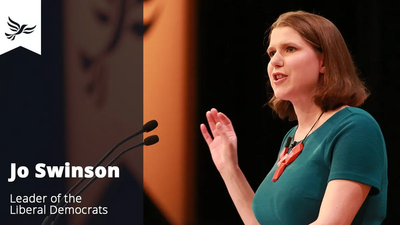Lib Dems promise 35 hours of free childcare from nine months old

Exclusive: Jo Swinson to announce dramatic increase as parties battle for female voters
Working parents would receive 35 hours a week free childcare from the day their baby turns nine months old under plans to be announced by the Lib Dem leader, Jo Swinson, as the opposition parties battle to win over female voters.
The Lib Dems will make a dramatic increase in the availability of free childcare the centrepiece of the party's manifesto, saying it would boost the economy by enabling more parents to return to the workforce earlier.
Swinson will say on Saturday: "The choice for parents now is simply not good enough. That is why Liberal Democrats are proposing a transformational change to our economy, by providing working parents with free childcare from when their child is nine months old.
"This will close the gap between the end of paid parental leave and the start of free childcare provision. It will finally give parents more choice about when they return to work and unlock their untapped potential for our economy. This is part of our bold plan to build a brighter future and fundamentally reshape our economy."
Swinson is keen to show that stopping Brexit is not her party's only preoccupation, as she tries to convince voters the 12 December general election is not a two-horse race between Labour and the Tories.
Jeremy Corbyn will launch Labour's policy offer for parents on Saturday. Speaking at an early years arts project in Leeds alongside the shadow education secretary, Angela Rayner, he will say the party would provide 30 hours a week free childcare for every child from the age of two.
Labour is also promising to open a Sure Start centre in every community - 1,000 in total - to "unlock the potential of every child". The centres were created under the last Labour government and acted as a one-stop shop for parents; running playgroups and hosting health visitors and other services, but many have since been closed down.
Corbyn will say: "The Conservatives are failing a whole generation of children. Labour will deliver the real change Britain needs. Parents are struggling to afford the childcare support they need, while many children are going hungry and growing up homeless."
All three-year-olds are currently entitled to 15 hours of free childcare a week, with most working families entitled to up to 30 hours - and lower-income parents receive extra help from when their child is two years old.
The Lib Dems say their plan would cost £14.6bn a year, which would be funded by reversing cuts to corporation tax made since 2016 and increasing capital gains tax so wealth is taxed in line with income. They say the changes would be phased in over five years.
Labour's costings will be published by the shadow chancellor, John McDonnell, alongside the party's manifesto - but he has already signalled his intention to increase borrowing significantly to fund a "social transformation fund".
The Conservatives rejected Labour's plans to extend childcare. Nick Gibb, the early years minister, said: "Giving children the best start in life is vital. That's why we are investing record amounts in high-quality childcare and we have seen the quality of childcare improve, with 95% of childcare now rated good or outstanding."
Many childcare providers argue that the level of funding provided by the government means they are unable to make ends meet. The Lib Dems say they will increase funding levels significantly, by 37% for two-year-olds to £7.22 per hour and by 20% for three and four-year-olds to £5.36 per hour.
Swinson's party has welcomed a series of high-profile defectors in recent months, including the former Labour MPs Chuka Umunna and Luciana Berger, and the former Conservatives Sam Gyimah and Sarah Wollaston.
The Lib Dems hope the issue of Brexit will put the party in contention in many remain-voting seats, including some in and around London, where the party was well behind Labour in 2017.
Under a "remain alliance" pact announced on Thursday the Lib Dems, Greens and Plaid Cymru have agreed to stand aside for each other in 60 seats in the hope that fielding a single anti-Brexit candidate will help to keep out the Conservatives.
Under the first-past-the-post voting system, tactical voting is when you vote for a party that you would not normally support in order to stop another party from winning. For example, in a constituency where the result is usually tight between a party you dislike and a party you somewhat dislike, and the party you support usually comes a distant third and has no chance of winning, you might choose to lend your vote to the party you somewhat dislike. This avoids '"wasting" your vote on a party that cannot win the seat, and boosting the chances that the party you dislike most will lose.
On Friday, Labour MPs from the campaign group Love Socialism Hate Brexit criticised the deal. They said some of the seats involved were held by ardently remain-supporting Labour MPs, including Ben Bradshaw and Neil Coyle.
Clive Lewis, the MP for Norwich South, said: "I've long championed the idea of a progressive alliance and there is a strong case for parties working together, given our electoral system. But this remain alliance risks taking votes away from Labour in marginals and targets good, sitting pro-remain Labour MPs. This could give the Tories the advantage in certain areas. It is irresponsible. I urge the parties involved to talk to Labour and reassess."
